An Phoblacht, Vol. 1, No. 14
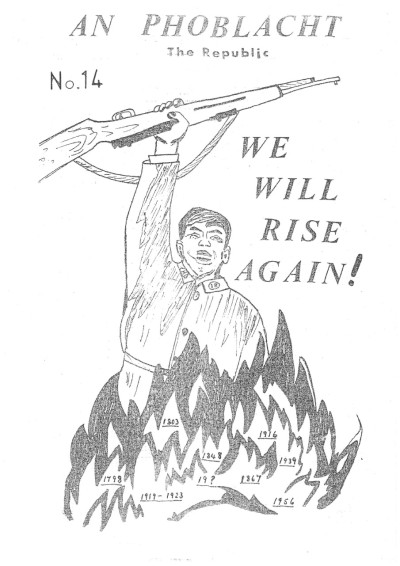
| Date: | 1967 |
|---|---|
| Organisation: | Irish Revolutionary Forces |
| Publication: | An Phoblacht [IRF] |
| Issue: | Volume 1, Number 14 December 1967 |
| Type: | Publication Issue |
| View: | View Document |
| Discuss: | Comments on this document |
| Subjects: |
Please note: The Irish Left Archive is provided as a non-commercial historical resource, open to all, and has reproduced this document as an accessible digital reference. Copyright remains with its original authors. If used on other sites, we would appreciate a link back and reference to The Irish Left Archive, in addition to the original creators. For re-publication, commercial, or other uses, please contact the original owners. If documents provided to The Irish Left Archive have been created for or added to other online archives, please inform us so sources can be credited.
Commentary From The Cedar Lounge Revolution
8th December 2014
Please note: This document was added to the archive together with An Phoblacht, Vol. 1: No. 13. The commentary refers to both.
Many thanks to Jim Lane for donating these issues of An Phoblacht – The Republic from Irish Revolutionary Forces. This completes the set in the Archive. But more documents from that period are on the way and will be posted up shortly. As has been said before, it is important to note how useful this document is in tracing – from a critical perspective, changing attitudes within Republicanism and Sinn Féin and the IRA during the late 1960s. That it was positioned critically in relation to Sinn Féin and the IRA is of particular importance offering a distinctively different view into the changes in those organisations.
As always it is probably most useful to quote briefly from both editions.
Issue 13 and 14 use the same cover as Volume 12 from August 1967, that being the figure of a volunteer rising from the flames beside the slogan ‘We Will Rise Again!’ and various key dates in Irish history in the flames.
The Editorial in issue 13, once more concentrates on the idea that there is an ‘ever-increasing trend towards Free-Statism in the Republican Movement, which is apparently destined to reach its peak by the end of the year’. And ‘it is obvious that all real Irish republicans will soon have to amok their move’. It continues ‘Clearly the question is no longer one on whether we need a newly constituted organisation to pursue the hopes and goals of Irish republicans; but one on how various groups and individuals of a revolutionary commitment throughout the country can establish a common ground upon which to meet and determine a united course of action’.
It speaks of how ‘we await the coming months with apprehension’ and ‘a course of action that has already been decided upon by the ‘Progressives’… to integrate with Free State politics’.
It argues that it is necessary to be ready to regroup Republican activists ‘in a new organisation’. It also notes that ‘participation in this vital work does not require an open commitment to the ‘Committee for Revolutionary Action’ which is responsible for the publication of AN PHOBLACHT. As we have said the CRA is not an organisation; by self-definition, it is a ‘Committee’ whose object is to combat reactionary trends within organised Republicanism, and to make preparations to bring a new organisation into existence only when this is absolutely necessary’.
It suggests that ‘All Republican Activists who, up until now, have hesitated to make contact with our co-ordinating committee, should consider carefully all the facts we have presented. They should clearly understand that such revolutionary coordination as we advocate does not entail a dual allegiance. We advocate only one allegiance, which is to the revolutionary principles of Irish Republicanism’. It also suggests that if necessary the CRA will support a move to a new organisation ‘at a Conference called for that purpose’.
It concludes with the following:
At this stage it is imperative that the real revolutionary Irish Republicans be bought to the realisation that they must act swiftly and with determination if they are to protect their heritage. If this is done then, as we see it, any move the ‘progressives’ make towards Free State politics will, in the long run, be in the best interests of the Cause, because it will clear our ranks of undersiables who would always be a source of weakness’.
Other pieces in this edition include one entitled ‘That Final Step’ which again considers the influence of the ‘Progressives’ within the Republican movement, and mentions moves towards ‘extending full recognition to the Free State and enter actively into its milieu’. It argues that ‘it is nonsensical to propose that ‘all have the ‘democratic’ right to advocate any course whatever for Irish Republicanism. This is not so; it never has, and it never can be the case. Such ‘democratic’ rights do not, and cannot apply to a freedom of action to undermine or destroy Republicanism’. Another argues that the charges of An Phoblacht have met a ‘poor answer’. A snippet notes that ‘Beginning with this issue we will publish a series of articles dealing with such things as organisation, principles, the role of the Army, etc. These shall serve as a necessary introduction to a ‘suggested’ Draft Programme which is in the process of compilation’. Eoin McDonaill writes on ‘Politics and Organization in Revolution’ and there is a ‘reprint’ of a ‘warning to ‘plotters’’.
The editorial in Issue 14 once more looks at the dynamics within the Republican Movement. It argues that ‘There is much hard work before us, if we are to engage seriously in the job of rebuilding the Irish Revolutionary effort to the point where it can initiate a successful struggle against the bastions of neo-colonialism. Beginning almost from scratch we must organise; we must educate; we must arm.’.
It suggests that:
Let us not fool ourselves on the true state of affairs… the revolutionary front is in bad shape. Popular support has been whittled away over the past few decades by poor leadership and incorrect policies; and our revolutionary base has also been seriously weakened and fragmented from similar causes. No knowledgeable person will suggest that all of this can be speedily rectified. It cannot.
It makes the point that:
The task facing us is not just a relatively straightforward one of regrouping and rearming sufficient forces to launch yet another campaign in the North-East. The fact is, we are faced with the need to build a completely new effort; to launch a completely fresh revolutionary epoch reminiscent of the pioneering labours of the United Irishmen and the IRB. This is a big job, which will require the unqualified commitment of men possessed of determination, staying power and clear-headedness; men who coldly and calmly measure the odds against them, and who set themselves to conquer such odds, in the full knowledge that tangible results will come neither easily nor quickly.
It continues:
We are well aware that erstwhile rebels are now hard at work disseminating the insidious idea that the age of revolution has past in Ireland. We’ve heard that one before. Those proselytes like to cover their spinelessness by projecting their image as that of realistic men motivated by the overpowering desire to come to grips with the very-day needs of the people. Evincing that fake sincerity that is the stock-in-trade of the professional confidence man, these politically dehydrated species will tell you the revolutionary road is now impossible in Ireland. Perhaps it is for them; but to a revolutionary serving a just cause – as ours most assuredly is – nothing is impossible; and that which may appear so to others will merely demand a greater effort of its solution.
It notes that:
The Reformaists have made their position crystal clear. To them a revolutionary struggle, with its associated goals of radical politico-economic change in the interests of the working classes, is out in favour of pork-barrel politics with a social-democratic slant. To go with them is to spit in the face of our long heritage of revolutionary struggle, and all the glib talk in the world cannot obscure this fact.
It concludes:
To adopt the course advocated by us is to project that heritage into the future; to continue by deed that worthwhile mission begun by our predecessors. This is the choice facing both Republicans and Socialists today; a choice all will have to make, because the time is on hand when all must declare themselves for or against THE IRISH REVOLUTION.
This issue also contains a piece on ‘The People’ which examines the base of support for Republicanism and another entitled ‘Cork IRA will break with Sinn Féin – says spokesman’ noting that the UCC branch of the Labour Party in its Spectre magazine [see here in the Archive] ‘carried an interview with a spokesman of the Cork IRA…in it [he] stated that ‘if, however SF decided to become part of the Twenty Six County establishment then the IRA would have no alternative but to break with them’.
Contents:
No.13, An Phoblacht October 1967
- Editorial p.1
- That Final Step p. 3
- A Poor Answer to our Charges p. 4
- Politics and Organisation in Revolution p. 6
- A Warning to “Plotters” p. 11
No.14, An Phoblacht December 1967
- Editorial p. 1
- “The People” p. 2
- Cork IRA will break with Sinn Fein p. 3
- The Question of Principles in the Irish Revolution p. 4
More from An Phoblacht [IRF]
An Phoblacht [IRF] in the archive
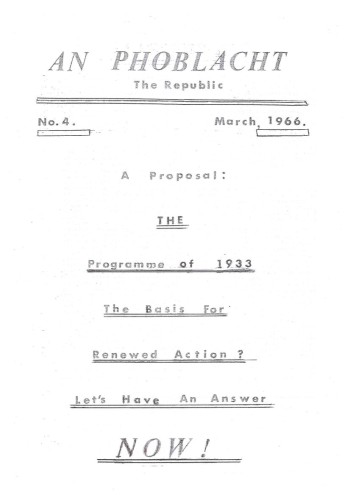
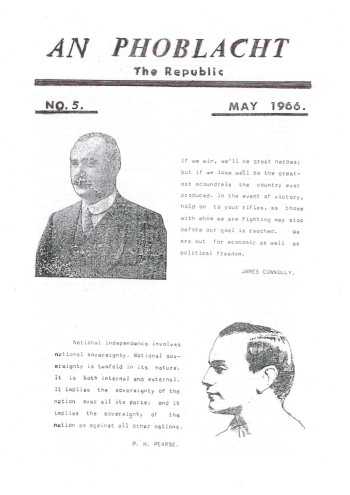
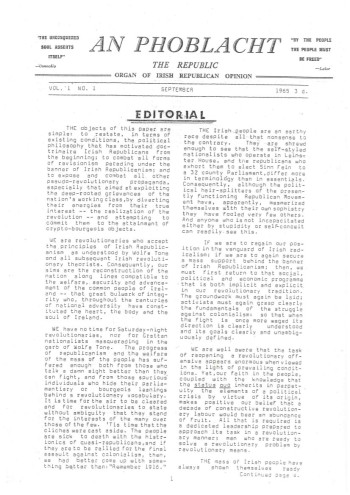
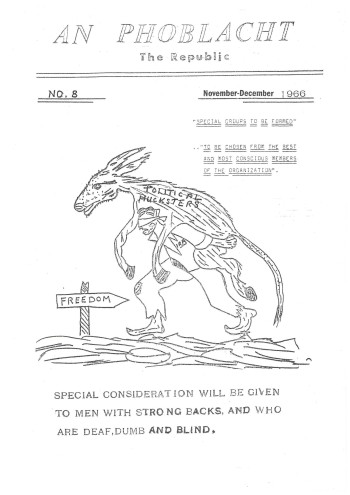
Comments
You can also join the discussion on The Cedar Lounge Revolution
No Comments yet.
Add a Comment
Comments can be formatted in Markdown format . Use the toolbar to apply the correct syntax to your comment. The basic formats are:
**Bold text**
Bold text
_Italic text_
Italic text
[A link](http://www.example.com)
A link